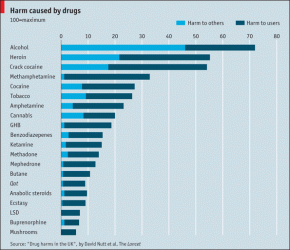Delta4Embassy
Gold Member
Drugs that cause most harm: Scoring drugs | The Economist
"MOST people would agree that some drugs are worse than others: heroin is probably considered to be more dangerous than marijuana, for instance. Because governments formulate criminal and social policies based upon classifications of harm, a new study published by the Lancet on November 1st makes interesting reading. Researchers led by Professor David Nutt, a former chief drugs adviser to the British government, asked drug-harm experts to rank 20 drugs (legal and illegal) on 16 measures of harm to the user and to wider society, such as damage to health, drug dependency, economic costs and crime. Alcohol is the most harmful drug in Britain, scoring 72 out of a possible 100, far more damaging than heroin (55) or crack cocaine (54). It is the most harmful to others by a wide margin, and is ranked fourth behind heroin, crack, and methamphetamine (crystal meth) for harm to the individual. The authors point out that the model's weightings, though based on judgment, were analysed and found to be stable as large changes would be needed to change the overall rankings."
"MOST people would agree that some drugs are worse than others: heroin is probably considered to be more dangerous than marijuana, for instance. Because governments formulate criminal and social policies based upon classifications of harm, a new study published by the Lancet on November 1st makes interesting reading. Researchers led by Professor David Nutt, a former chief drugs adviser to the British government, asked drug-harm experts to rank 20 drugs (legal and illegal) on 16 measures of harm to the user and to wider society, such as damage to health, drug dependency, economic costs and crime. Alcohol is the most harmful drug in Britain, scoring 72 out of a possible 100, far more damaging than heroin (55) or crack cocaine (54). It is the most harmful to others by a wide margin, and is ranked fourth behind heroin, crack, and methamphetamine (crystal meth) for harm to the individual. The authors point out that the model's weightings, though based on judgment, were analysed and found to be stable as large changes would be needed to change the overall rankings."
Attachments
Last edited:

